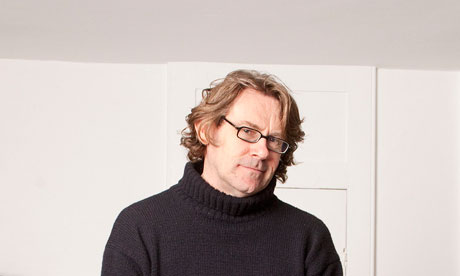
Nigel Slater's first recipe appeared in the Observer on 26 September, 1993. It featured mushrooms, peppers and damsons. "It was a very autumnal recipe. I wrote about what I'd eaten that week. It was as simple as that. This is what I eat and you might like it as well." Observer readers did like it. In fact, Observer readers loved it – and that love affair has only strengthened over the years. So much so that now, 19 years on, you, the readers, have voted Nigel the food personality of the year in the OFM Awards.
Nigel came to this newspaper having been approached shortly after the death of Jane Grigson who had revolutionised food writing during her 22 years on the Observer. It was a formidable act to follow. The then magazine editor, Michael Pilgrim, tried out a few different writers. "I confess that when I hired Nigel I hadn't a clue whether he could cook but he could certainly write," says Pilgrim. "He was and is the best writer on food in the country. He's inventive, nostalgic, funny, warm, clever and occasionally saucy (not in the bechamel sense), often all in one piece."
Since those early columns, Nigel's profile has grown in spectacular fashion. First there were the columns, then the cookbooks and then, in 2003, his autobiography, Toast, a remarkable account of his love of food, his childhood and, most notably, his tortuous relationship with his father. This was later made into a BBC film.
In Toast (serialised in OFM at the time of publication) we glimpsed a food writer willing to bare all, and inviting readers to share more than his recipes. This was emotion – served raw. When asked by Sue Lawley on Desert Island Discs in 2005 if he was still angry with his father, his answer was unequivocal. "I'm still angry. If you read Toast from beginning to end, it takes maybe six to seven hours to read it. He made my life a misery for six to seven years, and no, I am not going to forget that. I won't forget it."
Toast is one of the reasons why Observer readers have a unique relationship with Nigel. It's entirely different from the way we relate to Nigella, or Jamie, or Gordon, all of whom seem to happily embrace their public role. Nigel, on the other hand, is someone who has invited us to share his life as a child, but has remained, as an adult, a deeply private person.
"It's a difficult thing this because, although Toast was very intimate, it stopped when I was 18. And since then I've actually been incredibly private and people don't really know that much about me. The column I hope is written in a way that they know about my kitchen. They know what I cook, what I buy, how I prepare food. And other than that I am fiercely private."
And it's a privacy that extends to his work. He doesn't do celebrity. He doesn't do TV ads for pots and pans, or cereals, or high street shops. He writes and makes TV programmes that are born out of his love of food. His interest is in food, not fame.
"I don't accept the freebie side of it, when they say, 'We'll give you a free kitchen if you'll stand in front of it for a photograph every month.' I don't do any of that. PRs hate me. There's treasure there if you wanted to do it but I don't. It's just not the route I want to take. And once you go down that route – and it is tempting – once you go down that route I think people see you differently. People who've backed you throughout, and who read you every week. And to suddenly turn round and sell fish fingers on television. No."
But his leap to primetime BBC1 three years ago with his series Simple Suppers has catapulted Nigel to a different level of public recognition. Primetime brings with it a very public gaze, for a very private person.
"Simple Suppers has really changed everything and I struggle with it a little bit. The recognition factor's the thing that's scary – because I'm quite shy. I'm recognised all the time, wherever I go, and it can be a struggle."
His time on the Observer has seen many changes. At first he wrote his columns in long hand in a notebook – the genesis, literally, of his Kitchen Diaries, later published in 2005. Now Nigel writes on his iPad.
"It's taken the romance out of writing but I still love putting the column together. I wish I could go back to using my fountain pen but I can't."
Throughout the 20 years, he has shown incredible loyalty to the Observer – and mostly to you, the readers. When he speaks about the people who read this paper his voice is full of warmth and affection.
"I don't want to get too hippy-dippy but spiritually it does feel like I am in the right place. I was an Observer reader. My dad was an Observer reader. It kind of felt right. I also like the idea that the people who I'm writing for are the people who read the newspaper that I would read anyway. That works for me. Also, the paper's been very good to me. I mean, you know… 20 years of renewing contracts. I love the people I'm working with. I love the paper."
"There are places that I know I could skip to, where I probably could make more money but I wouldn't feel right there. I wouldn't feel I belong. It's that thing I suppose of finding yourself lucky to be in the right place and feeling you belong there."
Observer readers unquestionably feel Nigel belongs here.

